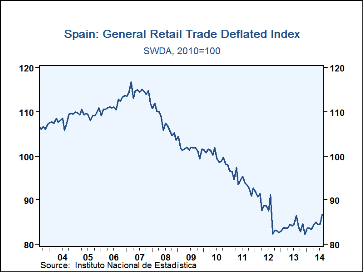 Global| Sep 29 2014
Global| Sep 29 2014Spain's Retail Sales Rise but Have Long Road to Recovery Ahead
Summary
Spain's real retail sales have slipped enormously since their peak back in 2007. In 2012 there was another sharp break lower in retail sales. However, from that point onward, Spain has built on that base and now there is a slight [...]
 Spain's real retail sales have slipped enormously since their peak back in 2007. In 2012 there was another sharp break lower in retail sales. However, from that point onward, Spain has built on that base and now there is a slight uptrend for real retail sales in place.
Spain's real retail sales have slipped enormously since their peak back in 2007. In 2012 there was another sharp break lower in retail sales. However, from that point onward, Spain has built on that base and now there is a slight uptrend for real retail sales in place.
Spanish real retail sales advanced by 2.8% in August compared to being flat in July and falling in June. Nonetheless, the sequential growth rates for real retail sales are on an accelerating trend, rising by 0.4% over 12 months, at a 7.6% annual rate over six months and at 8.7% annual rate over three months.
In the quarter to date, Spanish real retail sales are growing at a 5.9% annual rate, a good position two months into the third quarter.
Nominal retail sales have been more erratic. This series also contains auto sales, which tend to be a volatile category in retail sales. Growth rates for nominal retail sales do not show the same kind of acceleration as real retail sales. Food prices, which tend to be stable, have had erratic sequential rates in their growth rates. In the quarter to date, total nominal retail sales are falling at a 3.7% annual rate.
Spain is still dealing with the effects of deflation. That's something else that drives a wedge between the real and nominal reports on retail sales. In September, flash data from the statistical office INE released Monday showed that the consumer price index declined 0.2% year-over-year in September after easing 0.5% in August. Weak prices are generally an impediment to growth.
While the European Central Bank has implemented a program intended to stimulate private sector lending in the European Monetary Union, the recent aggregate lending data have not shown a significant effect from this program. Continued deflation in European Union member countries is simply another marker indicating that the ECB policies have not taken hold.

Robert Brusca
AuthorMore in Author Profile »Robert A. Brusca is Chief Economist of Fact and Opinion Economics, a consulting firm he founded in Manhattan. He has been an economist on Wall Street for over 25 years. He has visited central banking and large institutional clients in over 30 countries in his career as an economist. Mr. Brusca was a Divisional Research Chief at the Federal Reserve Bank of NY (Chief of the International Financial markets Division), a Fed Watcher at Irving Trust and Chief Economist at Nikko Securities International. He is widely quoted and appears in various media. Mr. Brusca holds an MA and Ph.D. in economics from Michigan State University and a BA in Economics from the University of Michigan. His research pursues his strong interests in non aligned policy economics as well as international economics. FAO Economics’ research targets investors to assist them in making better investment decisions in stocks, bonds and in a variety of international assets. The company does not manage money and has no conflicts in giving economic advice.
More Economy in Brief
 Global| Feb 05 2026
Global| Feb 05 2026Charts of the Week: Balanced Policy, Resilient Data and AI Narratives
by:Andrew Cates






